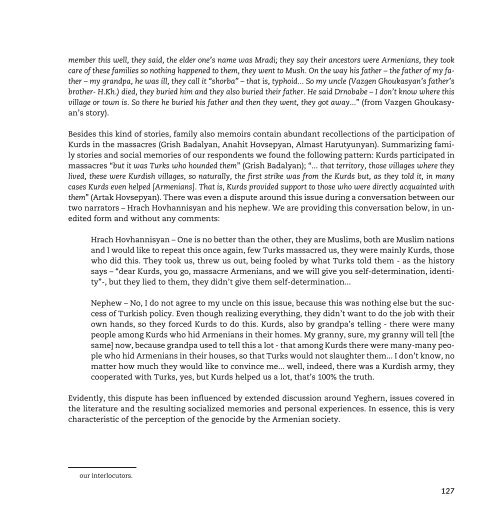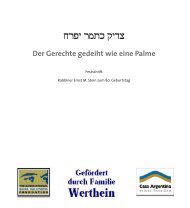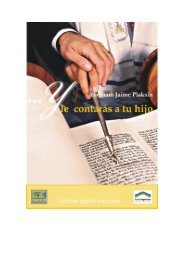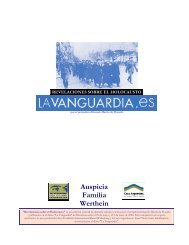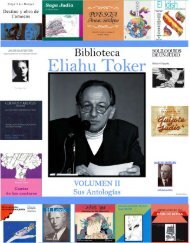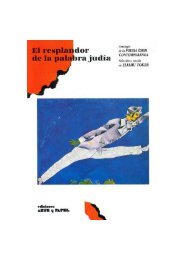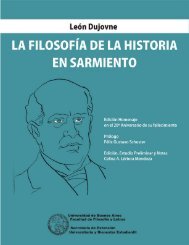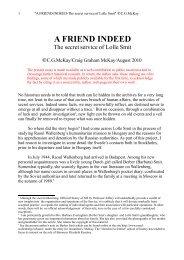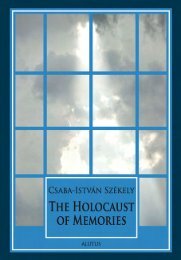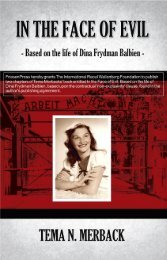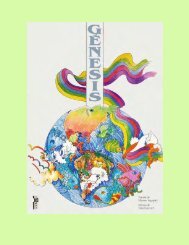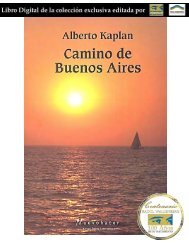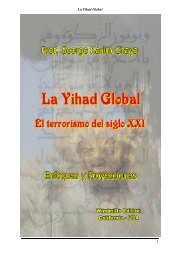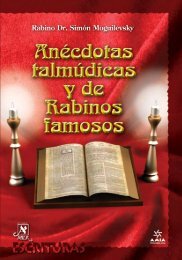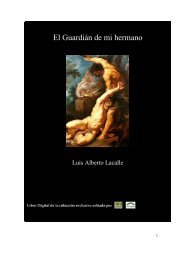who was “dost” <strong>to</strong> us... what I am telling, this was in 1895, according <strong>to</strong> what my father said... So, he <strong>to</strong>ld that,when our guys were in the house of this Turk, the soldiers came - three persons- they came and entered this man’shouse. <strong>The</strong>y knew it ... So, our guys were immediately offered <strong>to</strong> get in<strong>to</strong> the barn, they hid there... So they hid there,[the soldiers] came <strong>to</strong> this men’s house, saying “you are hiding gyavurs here.” He tells “no, I am not hiding gyavurs”.<strong>One</strong> or two of my grandpas were smokers, so they smoked when they were there. So, the soldiers said, “youare not telling the truth, you are not a smoker, but there is cigarette smell in your house.” He said “yes, my brothervisited me from the neighboring village, he is a heavy smoker, he smokes all the time”. This way this person rescuesthem but then he tells them “my friends, please do not come here for the second time,” because he started <strong>to</strong>fear – but then, in that case, he rescued my grandpas once.In family biographies of our respondents there are more memories about the support that was providedby Kurds - especially in Sasoun, Moush, and Bitlis regions. Aregnaz Poghosyan, for example, recounts“my mother and her sister went <strong>to</strong> the house of that Kurd kirva ... at first, he did not agree <strong>to</strong> help them, he said“they would come and kill you, and me <strong>to</strong>o”, but later he said “OK, stay here, I will hide you among the sheep...<strong>The</strong>y dressed in Kurdish dress...<strong>The</strong>y were sitting among the sheep at night, and they went <strong>to</strong> herd the sheep duringthe daytime... I don’t know how much time they had <strong>to</strong> spend there... That Kurd was such a nice person...” Manyparts in Almast Harutyunyan’s s<strong>to</strong>ry, <strong>to</strong>o, are related <strong>to</strong> cases of support provided by Kurds. Besides casesof personal support, according <strong>to</strong> the memoirs of our narra<strong>to</strong>rs, Kurds have also helped out whole settlementsof the Armenian population. “My father always used <strong>to</strong> tell – no one has been massacred in Manazkert;their city administra<strong>to</strong>r was Kurdish, he was the commander of four hundred soldiers; when these massacresspread all over Sasoun, the deportation started, this Kurd had gathered all Armenians at night - the Armenians ofManazkert... He gathered everyone, with their possessions [points this out], packed them up on wagons, broughtthem <strong>to</strong> the Khoy bridge, so that they crossed the river.” (from Vard Abajyan’s s<strong>to</strong>ry); “My grandma is from theDashtadem village of Khut; it wasn’t a large village, some 30-40 households and they were in good relations withKurds. So someone came <strong>to</strong> them secretly, he let them know. He said, Mkro, save your family if you can, Turks decided<strong>to</strong> massacre Armenians... and he <strong>to</strong>ld him not <strong>to</strong> tell this <strong>to</strong> anyone else. So, Jojo says that his family sufferedno human losses, no damage was caused <strong>to</strong> anyone, everyone survived, but they had <strong>to</strong> leave their home, they didnot risk <strong>to</strong> come back <strong>to</strong> bring [their stuff]. So they didn’t take anything with them <strong>to</strong> avoid any suspicion, they ranaway, hiding all the time. <strong>The</strong>n they arranged it with his uncle and with the Kurds. Kurds helped them, and theycame.” (from Mushegh Gevorgyan’s s<strong>to</strong>ry); “from the Sekh village , I would like <strong>to</strong> tell one more thing,this was real, indeed. My father was married, he had a wife and two daughters. During the deportation, in 1915,my father’s mother was ill, so my father stayed with his mother, he did not flee with his village. But at that time,when they fled, well, how <strong>to</strong> tell you... <strong>The</strong> Kurdish ashirat, finally, he brought all the people of that family, he deliveredthem <strong>to</strong> the border. He did not go beyond the border, he said, the Russian army is there, go, you will not bein danger there. So they came, up <strong>to</strong> Echmiadzin”(from Samvel Mirzoyan’s s<strong>to</strong>ry); “You know, the village Avarq,there were only six households there - three households were Kurds, three- Armenians. I remember this well,they <strong>to</strong>ld it, they say Kurds ... entered their village and started <strong>to</strong> kill ... they massacred. Finally, they said, a Kurd,the elderly person of Shigos, <strong>to</strong>ok care of them. Shigo is a Kurdish clan 1 , they never massacred any Armenians. I re-1 We frequently encountered memories about help that was provided by the Kurdish tribe “Shigo” or “sheko” in the s<strong>to</strong>ries of126
member this well, they said, the elder one’s name was Mradi; they say their ances<strong>to</strong>rs were Armenians, they <strong>to</strong>okcare of these families so nothing happened <strong>to</strong> them, they went <strong>to</strong> Mush. On the way his father – the father of my father– my grandpa, he was ill, they call it “shorba” – that is, typhoid... So my uncle (Vazgen Ghoukasyan’s father’sbrother- H.Kh.) died, they buried him and they also buried their father. He said Drnobabe – I don’t know where thisvillage or <strong>to</strong>wn is. So there he buried his father and then they went, they got away...” (from Vazgen Ghoukasyan’ss<strong>to</strong>ry).Besides this kind of s<strong>to</strong>ries, family also memoirs contain abundant recollections of the participation ofKurds in the massacres (Grish Badalyan, Anahit Hovsepyan, Almast Harutyunyan). Summarizing familys<strong>to</strong>ries and social memories of our respondents we found the following pattern: Kurds participated inmassacres “but it was Turks who hounded them” (Grish Badalyan); “... that terri<strong>to</strong>ry, those villages where theylived, these were Kurdish villages, so naturally, the first strike was from the Kurds but, as they <strong>to</strong>ld it, in manycases Kurds even helped [Armenians]. That is, Kurds provided support <strong>to</strong> those who were directly acquainted withthem” (Artak Hovsepyan). <strong>The</strong>re was even a dispute around this issue during a conversation between ourtwo narra<strong>to</strong>rs – Hrach Hovhannisyan and his nephew. We are providing this conversation below, in uneditedform and without any comments:Hrach Hovhannisyan – <strong>One</strong> is no better than the other, they are Muslims, both are Muslim nationsand I would like <strong>to</strong> repeat this once again, few Turks massacred us, they were mainly Kurds, thosewho did this. <strong>The</strong>y <strong>to</strong>ok us, threw us out, being fooled by what Turks <strong>to</strong>ld them - as the his<strong>to</strong>rysays – “dear Kurds, you go, massacre Armenians, and we will give you self-determination, identity”-,but they lied <strong>to</strong> them, they didn’t give them self-determination...Nephew – No, I do not agree <strong>to</strong> my uncle on this issue, because this was nothing else but the successof Turkish policy. Even though realizing everything, they didn’t want <strong>to</strong> do the job with theirown hands, so they forced Kurds <strong>to</strong> do this. Kurds, also by grandpa’s telling - there were manypeople among Kurds who hid Armenians in their homes. My granny, sure, my granny will tell [thesame] now, because grandpa used <strong>to</strong> tell this a lot - that among Kurds there were many-many peoplewho hid Armenians in their houses, so that Turks would not slaughter them... I don’t know, nomatter how much they would like <strong>to</strong> convince me... well, indeed, there was a Kurdish army, theycooperated with Turks, yes, but Kurds helped us a lot, that’s 100% the truth.Evidently, this dispute has been influenced by extended discussion around Yeghern, issues covered inthe literature and the resulting socialized memories and personal experiences. In essence, this is verycharacteristic of the perception of the genocide by the Armenian society.our interlocu<strong>to</strong>rs.127
- Page 2 and 3:
Published by:Institut für Internat
- Page 5 and 6:
ContentsForeword...................
- Page 7 and 8:
ForewordThe project “Adult Educat
- Page 10 and 11:
Aras, Yasin Aras, Welat Ay, Cenk Ce
- Page 12 and 13:
The main audience of this book is o
- Page 15 and 16:
“Wish they hadn’t left”:The B
- Page 17 and 18:
ed by 1915 and where memories of Ar
- Page 19 and 20:
1915 tends to be represented by int
- Page 21 and 22:
Yet to a large extent, Turkish inte
- Page 23 and 24:
this, we can’t. It’s impossible
- Page 25 and 26:
een very advanced in trade and craf
- Page 27 and 28:
How to Come to Terms with Phantom P
- Page 29 and 30:
It is always you who has to be nice
- Page 32 and 33:
to the way he was raised: “They f
- Page 34 and 35:
empathize with Armenians: “My aun
- Page 36 and 37:
Adil is not the only one marked by
- Page 38 and 39:
ness may be an attempt to overcome
- Page 40 and 41:
dernity and the oral transmission o
- Page 42 and 43:
A soup pot with spoons around itAt
- Page 44 and 45:
What if My Mother is Armenian?Ruhi
- Page 46 and 47:
If I were younger I’d get baptize
- Page 48:
with butter. We’ll serve the impo
- Page 51 and 52:
The time Salih and Gavrik are worki
- Page 53 and 54:
Turkey’s changing context is refr
- Page 55 and 56:
‘It was to be expected.’ And my
- Page 57 and 58:
against one another. The feet of th
- Page 59 and 60:
Fear of Losing a CityZübeyde was b
- Page 61 and 62:
half for me.’ But what do our Mus
- Page 63 and 64:
e discussed when the kids were arou
- Page 65 and 66:
possible by the difference in relig
- Page 67 and 68:
The Charm of AraratMehmet is a 62-y
- Page 69 and 70:
dogs protected the sheep against wo
- Page 71 and 72:
The Story of the “Night People”
- Page 73 and 74:
“I don’t know why, but my grand
- Page 75: Research in Armenia:“Whom to Forg
- Page 78 and 79: and can generally be located in Tur
- Page 80 and 81: “Whom to Forgive? What to Forgive
- Page 82 and 83: “Private Stories”After the esta
- Page 84 and 85: Recalling MemoriesOral history diff
- Page 86 and 87: In the village of Ujan, where the v
- Page 88 and 89: The home-museum of Gevork Chaush in
- Page 90 and 91: Memorial in the Ashnak village dedi
- Page 92 and 93: other regions are entirely populate
- Page 94 and 95: sources and materials for their mem
- Page 96 and 97: Ergir’s Soil is Strong, Ergir’s
- Page 98: Tatevik, the granddaughterof Mihran
- Page 101 and 102: eral meanings in Armenian -”whole
- Page 103 and 104: The Gospel with Golden Binding of S
- Page 105 and 106: keeps a copper chalice that was bro
- Page 107 and 108: In some families the passports of t
- Page 109 and 110: at that time, Mustafa and Jamal, wh
- Page 111 and 112: People were so frightened to lose g
- Page 113 and 114: naked, they were decapitating every
- Page 115 and 116: Water, Fire, Desert“There was an
- Page 117 and 118: his mother dragged him behind her,
- Page 119 and 120: Many of our narrators mention the R
- Page 121 and 122: In the word-stock of the survivors
- Page 123 and 124: in Kurdish villages, and helping th
- Page 125: “Well, They Are Human Too”Even
- Page 129 and 130: speak to each other. Questioned by
- Page 131 and 132: Hamze Ptshuk, survived from Hosnut
- Page 133 and 134: “I don’t Know...”Why did this
- Page 135 and 136: “My Dear Almast, Write it Down, W
- Page 137 and 138: took his rifle and ran. The dog fel
- Page 139 and 140: she didn’t tell it to me. In the
- Page 141 and 142: elder guy in this house died and hi
- Page 143 and 144: AH - Turks always killed to get int
- Page 145 and 146: “My Father used to Tell us at Hom
- Page 147 and 148: person... I have never seen him, bu
- Page 149 and 150: gotten what you knew”. So, out of
- Page 151 and 152: a paid Adult Residential Facility,
- Page 153 and 154: It was probably after 60s... My fat
- Page 155 and 156: the Vardevar 1 day . Even if we mak
- Page 157 and 158: that this wasn’t a dream... and..
- Page 159 and 160: was our historical village. Nich, I
- Page 161 and 162: just filming around myself with no
- Page 163 and 164: that person whether I could take a
- Page 165: [Turk. wife]”. In the morning I t
- Page 168 and 169: 4 Albert Mamikonyan,1953, in Kirova
- Page 170 and 171: 11 Almast Harutyunyan,1920, Ujan vi
- Page 172 and 173: 18 Eleonora Ghazaryan.1949, Ashnak
- Page 174 and 175: 26 Nairi Tajiryan,1936, Egypt (Cair
- Page 176:
33 Vazgen Ghukasyan,1933, Ashnak vi


